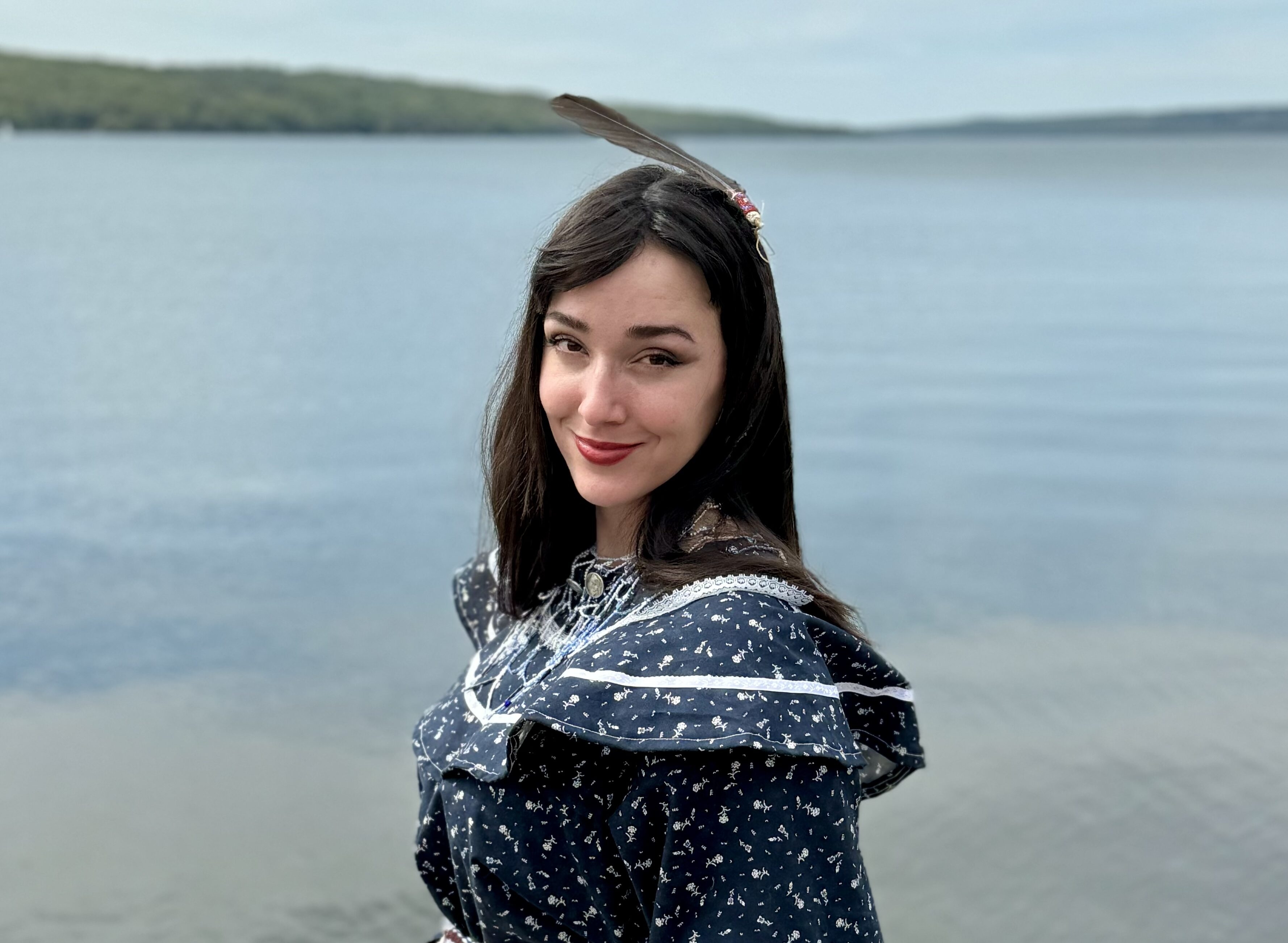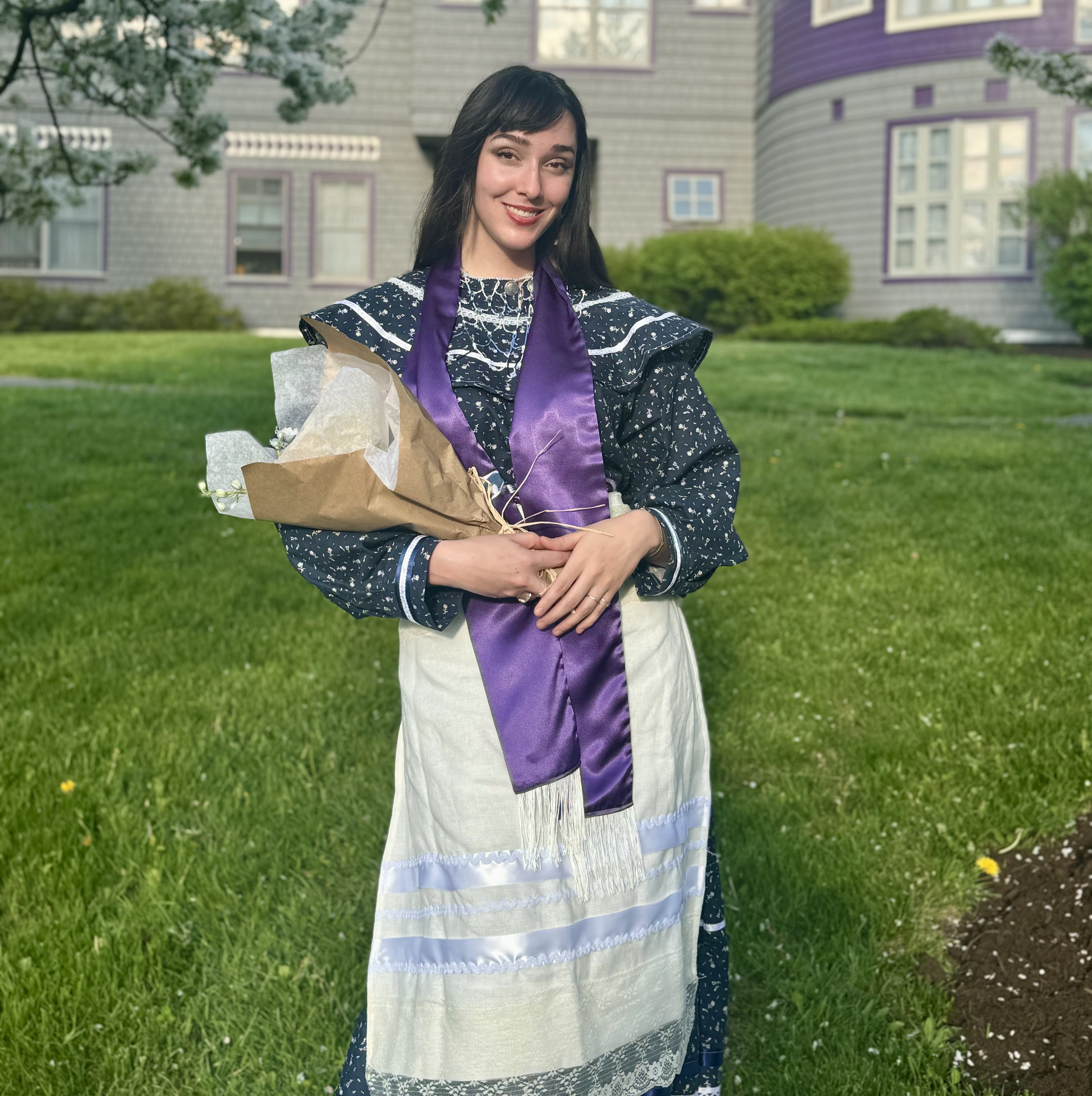This website uses cookies
We use cookies to ensure that we give you the best experience on our website. If you continue to use this site we will assume that you are happy with it.

As one of only a handful of Indigenous students at Cornell Law School, Carolyn Click ’24 feels her presence is much bigger than just herself. She stresses that coming to Cornell is such a privilege; an opportunity to make an abundance of good decisions that will put her in a place to not only advance herself, but her community as well.
Raised in Oklahoma, and a citizen of the Muscogee Creek Nation, Click always wanted to go the distance and shatter the stereotypes that many Indigenous people face. She also always had a passion for art and culture. After receiving her master’s degree in art history at the University of Colorado Boulder, she decided to come home and complete a semester at her tribal college, the College of the Muscogee Nation. While there, she studied Mvskoke language and culture. Her combined interest in intellectual property and Native issues is what ultimately brought her to the doors of Cornell Law School.
“It’s really amazing because there are so many different Native Nations in Oklahoma,” said Click. “That is what I’m used to. But moving to New York, you think of Manhattan and skyscrapers even though Cornell is actually in the heart of another Native community, the Haudenosaunee.” She also liked that Cornell had a Federal Indian Law Practicum, and that one of the teachers at the school is actually the former president of the Seneca Nation, Robert Odawi Porter.
Once at Cornell, Click quickly discovered that there is actually quite a vibrant graduate and undergraduate Indigenous community here. The American Indian and Indigenous Study Program at Cornell is very involved in local Indigenous communities, so “even if the Law School only had a few Indigenous students, I could always find a community at Cornell, broadly,” said Click. “As a previous president of the Native American Law Students Association, I have been able to pull on those resources during my time here.”
Nevertheless, Click has observed that the general population’s understanding of Indigenous issues, both on campus and in society broadly is still severely underinformed. She feels that Indigenous students carry a heavy burden of both suffering from invisibility while simultaneously trying to educate their peers on top of the regular stress of being a student.
“When you’re only one of a few Indigenous students in the entire law school, it’s hard because you become sort of a poster child for Native issues, which is a big burden to carry. Because suddenly whenever someone says ‘Indian’ in class, everyone turns around and looks at you. Then you become the educator and not just the student.”
Click noted that it’s not uncommon to be in a law class where either peers or the professor might say something inaccurate about Native Peoples.
“Coming here [Cornell Law School] it was really important for me to learn how to give charity to opposing viewpoints, understanding that most people don’t intend to offend, they just lack the proper knowledge one would need to have an understanding and constructive conversation,” said Click.
While Click’s pursuit of a career in intellectual property law has gone largely as planned, she did not anticipate that her law school experience would include becoming deeply involved with the Capital Punishment Clinic or teaching in a maximum-security prison in Auburn, New York.
“Those have been two of the most transformative experiences I’ve had here,” said Click. “I think that every attorney, judge, and legislator should have to spend time in prisons genuinely interacting with incarcerated people. I have learned so much that will impact not only my pro bono practice, but my approach to law in general.”
Following graduation, Click will become an associate at Latham & Watkins, where she looks forward to joining their copyright practice as well as participating in their strong pro-bono program.
Click feels that coming to Cornell Law is a privilege, which means that its incumbent on graduates such as her to make good decisions. “You have to pull as you climb,” she said. “You can’t just leave your community behind because you work in the big city now.”
Click feels a responsibility after law school to not only advance herself, but her community as well, especially since there is such a small number of Indigenous students here at Cornell Law to begin with.
“It is extra challenging for Indigenous students to compete in the legal world because they are not only facing the stress of law school, but they are dealing with the repercussion of hundreds of years of disenfranchisement,” said Click. She hopes that the Law School will push for more Native enrollment and provide more scholarship support.
“When you donate to one Indigenous student, you affect an entire community of people. It creates a ripple effect where that scholarship recipient then helps others like them climb the same ladder,” said Click.
Click feels she has left a mark here at Cornell Law, but hopes to see more students like herself set up for success in the future. She has been awarded the honor of being a J.D. Degree Marshall at Cornell University’s main graduation ceremony in late May—blowing the doors wide open for more students like herself to contribute to the ever-growing Indigenous legacy here at Cornell.
